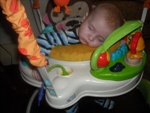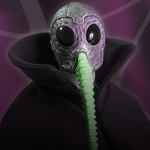Like being drunk, what a great description of it! And I think you are correct about being uncomfortable while sleeping, I would never have thought of that in a million years but it makes absolute sense. But I will fall asleep on the weekends, usually in the afternoon, and sleep all day and all night. Does this really make up for the lost sleep?I suspect my body was trying to avoid or at least postpone sleeping because it was uncomfortable, even though I could not remember it. Falling asleep before midnight was impossible. Once I fell asleep I could sleep for a long time though.
Tired, not sleepy
- raggedykat
- Posts: 195
- Joined: Wed Jul 01, 2009 12:00 pm
- Location: PA
Re: Tired, not sleepy
First they ignore you, then they laugh at you, then they fight you, then you win.
Mohandas Gandhi
Mohandas Gandhi
Re: Tired, not sleepy
Nasal congestion doesn't cause the airway to collapse and become an obstruction.Oneiros wrote:I do however have some hope for those things you put in your mouth to keep your jaw and/or tongue in place. If my problem is simply that my jaw or tongue falls back, that should fix it. Or, if the blockage is in my nose, nasal irrigation and maybe some medicine might fix it. I do have a stuffed nose pretty often, especially when trying to sleep. But I don't know yet what is blocking, how much, and how and when it happens, so it's hard to know if anything will work.
The other tools to modify mouth, jaw, tongue placement may or may not help. Dental appliances may or may not help.
Problem being, the only way to know for sure is to have a sleep study done while wearing the device and actually see if the obstructive events are eliminated. One cannot rely on subjective findings to know for sure.
_________________
| Machine: AirCurve™ 10 VAuto BiLevel Machine with HumidAir™ Heated Humidifier |
| Additional Comments: Mask Bleep Eclipse https://bleepsleep.com/the-eclipse/ |
I may have to RISE but I refuse to SHINE.
Re: Tired, not sleepy
I don't know about collapse, but since the nasal passage is an airway, you get an airway obstruction if it is obstructed. I think it is fairly well documented that a bad nasal passage can cause OSA or UARS, and the sleep doctor I went to recommended nasal irrigation for mild cases.Pugsy wrote:Nasal congestion doesn't cause the airway to collapse and become an obstruction.Oneiros wrote:I do however have some hope for those things you put in your mouth to keep your jaw and/or tongue in place. If my problem is simply that my jaw or tongue falls back, that should fix it. Or, if the blockage is in my nose, nasal irrigation and maybe some medicine might fix it. I do have a stuffed nose pretty often, especially when trying to sleep. But I don't know yet what is blocking, how much, and how and when it happens, so it's hard to know if anything will work.
Does it really have to be a real sleep study? I wouldn't really trust just subjective measurements, but I am planning to get an oximeter and see if the readings correlate with how I feel. If it correlates well I can use it to evaluate other treatments. Also, I can easily feel the difference between a night with and without CPAP the day after.Pugsy wrote: The other tools to modify mouth, jaw, tongue placement may or may not help. Dental appliances may or may not help.
Problem being, the only way to know for sure is to have a sleep study done while wearing the device and actually see if the obstructive events are eliminated. One cannot rely on subjective findings to know for sure.
Re: Tired, not sleepy
Yeah, it does feel like being drunk, doesn't it? But just the bad parts of being drunk. Not the fun parts. It would have been interesting if it was the other way around.raggedykat wrote:Like being drunk, what a great description of it!I suspect my body was trying to avoid or at least postpone sleeping because it was uncomfortable, even though I could not remember it. Falling asleep before midnight was impossible. Once I fell asleep I could sleep for a long time though.
At least on a short time scale, like a few weeks, human sleep is supposed to be pretty simple. Your average is around 8 hours per day. If you sleep two hours less today, you will feel somewhat more sleepy, and if you sleep two hours extra a later day you catch up and you're back where you started. For every hour of sleep less than 8 hour (or something similar, the exact time varies only slightly from person to person) you accumulate an hour of sleep debt that you have to sleep an extra hour to get rid of. There has been plenty of experiments that confirms this. See e.g. the book The Promise of Sleep. They don't know if it holds for longer periods of time though.raggedykat wrote: And I think you are correct about being uncomfortable while sleeping, I would never have thought of that in a million years but it makes absolute sense. But I will fall asleep on the weekends, usually in the afternoon, and sleep all day and all night. Does this really make up for the lost sleep?
So, if you sleep 10 hours less than you should during the week and 10 hours extra during the weekend, you should be stable from week to week.
Although I'm not sure if it holds for sleep apnea or UARS sufferers.
BTW, were you diagnosed with sleep apnea or UARS?
Re: Tired, not sleepy
Doesn't work like that...remember with apnea, there is significant O2 deprivation and that causes to one extent or another damage to the brain that may or may not be reversible. Then, with the demands on the heart to compensate for the often dangerously low O2 levels, it races your pulse (tachycardia) and breath rate (hyperventilation), the heart eventually enlarges. And, there's the hypertension that develops. And, within 5 yrs, if you have any of the genes for diabetes, you get that too. Plus, a good number of us report thyroid/gall bladder/gout problems. My sleep doc says that the blood of untreated apnea sufferers becomes a "chemical stew" with all values skewed which takes months of CPAP therapy to normalize. So there is little chance with the brain sensing impending death multiple times an hr and hitting the panic button pumping or high amts of survival (stress) hormones that more sleep on the weekend is going to help -- with apnea, we have trouble surviving sleep! Until the airway is stented open by the pressure we uniquely need to prevent these apneic events, our sleep will never be 'normal,' restorative, or refreshing. Apnea is not so much about lost sleep as it is about the lack of deep sleep and sometimes no REM sleep at all because the brain is focused on ensuring it can arouse us sufficiently to prevent suffocation during sleep. After xPAP therapy is begun, the brain is not sent into a panic time and time again each night, so it will allow one to fall into deeper and deeper sleep allowing the body to heal itself. Eventually, the time asleep typically becomes longer and more restful as healing progresses. Eventually, the body determines its new sleep duration (# of hrs) for restful sleep and one starts awakening alert and refreshed.Oneiros wrote:...<paraphrased one for one sleep debt>...Although I'm not sure if it holds for sleep apnea or UARS sufferers...
ResMed S9 range 9.8-17, RespCare Hybrid FFM
Never, never, never, never say never.
Never, never, never, never say never.











